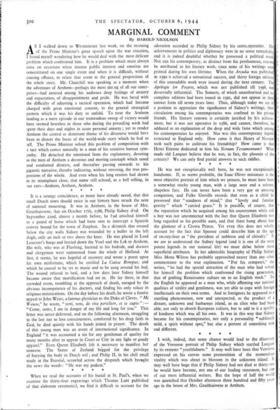MARGINAL COMMENT
By HAROLD NICOLSON S I walked down to Westminster last week, on the morning of the Prime Minister's great speech upon the war situation, I found myself wondering how he would deal with the most delicate problem which confronted him. It is a problem which must always arise on occasions when intense public interest and emotion are concentrated on one single event and when it is difficult, without causing offence, to relate that event to the general proportions of the whole story. Mr. Churchill was speaking at a moment when the adventure of Arnhem—perhaps the most daring of all our enter- prises—had aroused among his audience deep feelings of anxiety and expectation, of disappointment and pride. He was faced with the difficulty of adjusting a tactical operation, which had become charged with great emotional content, to the general strategical pattern which it was his duty to unfold. To treat the Arnhem landing as a mere episode in our tremendous sweep of victory would have seemed heartless to those who during the preceding week had spent their days and nights in acute personal anxiety ; yet to render Arnhem the central or dominant theme of his discourse would have been to distort the focus of the world-wide story which he had to tell. The Prime Minister solved this problem of composition with a tact which comes naturally to a man- of his sensitive human sym- pathy. He detached the emotional from the explanatory, devoting to the men of Arnhem a decorous and moving cenotaph which eased and comforted distress, and thereafter passing onwards to his gigantic narrative, thereby indicating, without stressing, the true pro- portions of the whole. And even when his long oration had drawn to its triumphant close, that name still echoed, as a bell tolling, in our ears—Arnhem, Arnhem, Arnhem.


























 Previous page
Previous page